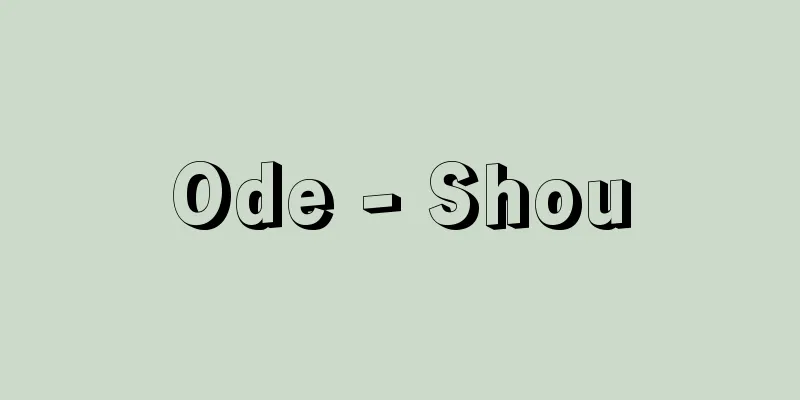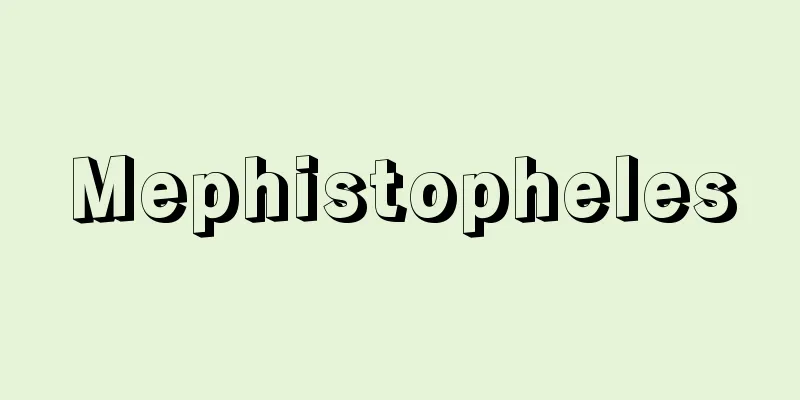Ode - Shou

〘Noun〙① One of the six meanings in the Book of Songs, one of the content classifications along with Wind and Elegance. A court song that praises the ruler's virtue and addresses it to the ancestors and gods. It is divided into three parts: Song of Zhou, Song of Shang, and Song of Lu. ※Kojin (905-914), Mana Preface: "Poetry has two six meanings . One is called Wind, the other is called Fu, (abbreviated) and the other six are called Song." [Large Preface to the Book of Songs]② Words that praise the virtue of a person or the beauty of an object. Also, poetry that contains such words. Ode. ※Sasamegoto (around 1463-64), Vol. 1, "Ode: The Heart of Songs" ※Haikai, Basho's Manjiki Kaishi (Ode to Onsen) (1689), "Ode to Onsen"③ A song with lyrics praising the Triune God in Christianity. ※Improvisational Poet (1901)〈translated by Mori Ogai〉Vegetarian Days・Jiraku「Miserere, mei, domine, have mercy on me, O Lord, from the phrase, hence the name of the Fiftyth Canticle」④ ⇒Ju (Cantticle)Ju [Ode]Zu [Ode]shou-suru [praise]Shou-su [Ode]Source: The Selected Edition of the Japanese Language Dictionary About the Selected Edition of the Japanese Language Dictionary Information |
〘名〙① 「詩経」の六義(りくぎ)の一つで、風、雅とともに内容上の分類の一つ。君主の盛徳をほめ、祖先神に告げる宮廷歌。周頌・商頌・魯頌の三つに分かれる。※古今(905‐914)真名序「和歌有二六義一。一曰風、二曰賦〈略〉六曰頌」 〔詩経大序〕② 人の徳や物の美などをほめたたえることば。また、そのことばを入れた詩歌。頌詞。※ささめごと(1463‐64頃)上「頌 いはひ歌の心」※俳諧・芭蕉真蹟懐紙(温泉頌)(1689)「温泉頌」③ キリスト教で三位一体の神に対する讚美の歌詞をもつ歌。※即興詩人(1901)〈森鴎外訳〉精進日・寺楽「ミゼレエレ、メイ、ドミネ、憐を我に垂れよ、主よの句に取りたるにて、第五十頌の名なり」④ ⇒じゅ(頌)
じゅ【頌】ず【頌】しょう‐・する【頌】しょう‐・す【頌】出典 精選版 日本国語大辞典精選版 日本国語大辞典について 情報 |
Recommend
Piast dynasty - Piastów
A princely family of Polani, based in Gniezno, who...
software
A collection of data that describes programs and i...
Pearl Harbor - Shinjuwan
The original name is Pearl Harbor. It is a natural...
Distribution system
Distribution refers to the entire social distribu...
Enma dung beetle - Enma dung beetle
…These beetles are collectively called dung beetl...
Peters, CF
… In the second half of this century, with the de...
Chishima Zekishō - Chishima Zekishō
A perennial plant of the lily family that grows on...
Megenberg, K. von (English spelling)
...The story that explains why seawater is salty ...
Speech understanding
...If the dictionary has a vocabulary of around 2...
Olympio, S. (English spelling) OlympioS
...Meanwhile, an autonomous government was establ...
Goshi
An open market was established on the borders of ...
Genus Canthaceae - Canthaceae
…The culm is low, usually less than 2m, with only...
Aeridopsis
...Cultivation through crossbreeding has also bee...
Absorption dynamometer
A torque measuring device is a device that measure...
Uranium
〘Noun〙 (uranium) =uranium ※From the Book of Shamit...









